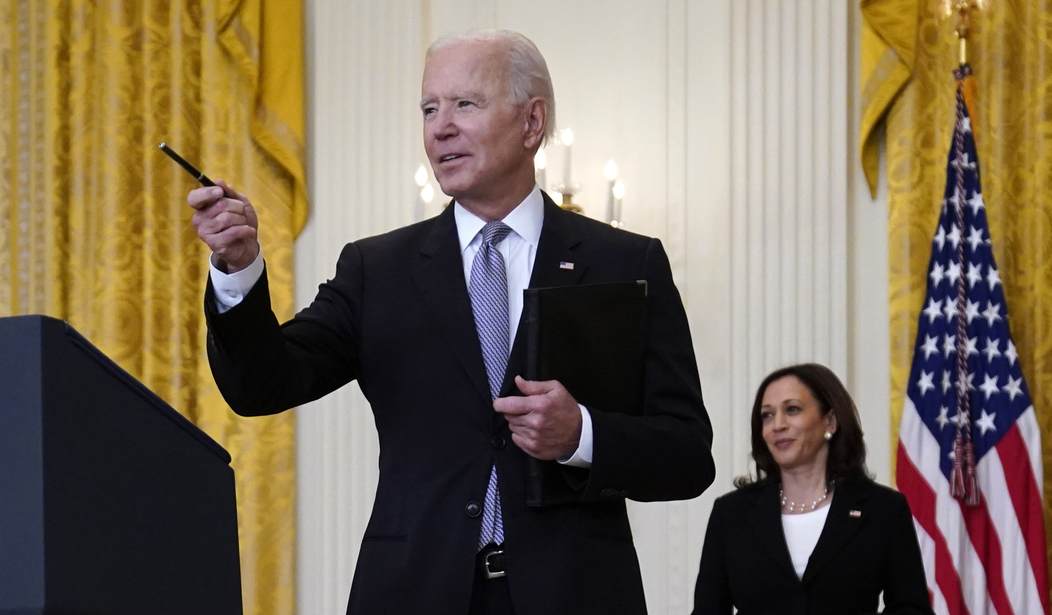President Biden has been on the job for a little more than four months, however, in that relatively short period he has signed and proposed some of the most audacious and expensive pieces of legislation in U.S. history.
What’s more, this comes as the U.S. national debt, which now stands at a mind-boggling$28.3 trillion, becomes more of a millstone upon the sputtering U.S. economy than ever before.
To date, Biden has signed the $1.9 trillionAmerican Rescue Plan, which the administration describes as a plan “to change the course of the pandemic, build a bridge towards economic recovery, and invest in racial justice. The American Rescue Plan will address the stark, intergenerational inequities that have worsened in the wake of COVID-19.”
Apparently, the administration left out the part about the American Rescue Plan exploding the national debt and annual deficit.
According to the Committee for a Responsible Federal Budget(CRFB), “Several measures in the $1.9 trillion American Rescue Plan Act that provide temporary relief are likely to be extended past their expiration dates. … Altogether, we estimate these potential extensions would cost $1.9 trillion before interest, boosting the overall cost of the bill to $4.1 trillion when interest is included.”
But that is only half of the story.
As CRFB notes, “These extensions would substantially increase deficits and debt. Under current law, CBO projects debt to rise from $21.9 trillion today to $35.3 trillion (or 107 percent of GDP) and deficits to reach $1.9 trillion (or 5.7 percent of GDP) by 2031. Passage of the American Rescue Plan Act alone, excluding any dynamic effects, would boost 2031 debt to $37.4 trillion (or 114 percent of GDP) and deficits to $1.9 trillion (or 5.9 percent of GDP).”
Recommended
Yet, that is just the tip of the spending spree iceberg.
The Biden administration has also proposed, and is actively promoting, two other colossal spending packages: The American Families Plan and the American Jobs Plan.
The American Families Plan, if passed and signed into law, would cost a whopping $1.8 trillion. According to CRFB, “Over the next decade, the plan would add roughly $300 billion to the deficit, before interest.”
The American Jobs Plan is estimated to cost American taxpayers $2.65 trillion should it ever become law. “Over the traditional 10-year budget window, we estimate the net increase in the deficit would be approximately $900 billion,” per CRFB’s analysis.
So, in less than four months, President Biden has signed and proposed more than $6.35 trillion in new spending. This would be on top of the $4 trillion that the U.S. government spends on an annual basis, just to keep the government running.
Obviously, this reckless spending is not sustainable. Yet, that notion seems to fall on deaf ears in the White House and the halls of Congress.
That begs the question: What can we do, if anything, to avoid a financial reckoning that would make the Great Depression look like a stroll in the park?
Well, for starters, we could do what many fiscal conservatives and commonsense Americans have been promoting for decades: a balanced budget amendment (BBA).
According to the Peter G. Peterson Foundation (PPF), “In its simplest form, a balanced budget amendment would add a budget rule to the Constitution that would require federal spending not to exceed federal receipts. The amendment would make it unconstitutional for the federal government to run annual budget deficits.”
Of course, like all things in life, a BBA presents trade-offs.
“Proponents of a constitutional amendment hold the view that future generations have a right to be protected from debts accumulated by earlier generations. Because the Congress and President are unwilling or unable to rein in the debt through normal legislative procedures, they argue that only a constitutional constraint will be strong enough to rein in lawmakers' tendency to act in fiscally irresponsible ways,” notes PPF.
On the other hand, “Opponents to a constitutional amendment argue that it could limit the ability of future policymakers to use fiscal policy to counteract recessions or respond to national emergencies.Moreover, they argue that the cause of our fiscal imbalances is a lack of political will, not an inadequate process.”
Perhaps both sides are right, to a degree. However, from a moral standpoint, it is downright despicable that today’s political leaders (on both sides of the political aisle) would wantonly spend money we don’t have, to be paid by future generations.
And, in a nutshell, that is what this is all about. Are we willing to live high on the hog while footing the bill on future generations?
If that is indeed the case, I wonder what past generations (like those who stormed the beaches on D-Day so future generations could live in freedom) would think of present-day America?
Chris Talgo (ctalgo@heartland.org) is senior editor at The Heartland Institute.

























Join the conversation as a VIP Member